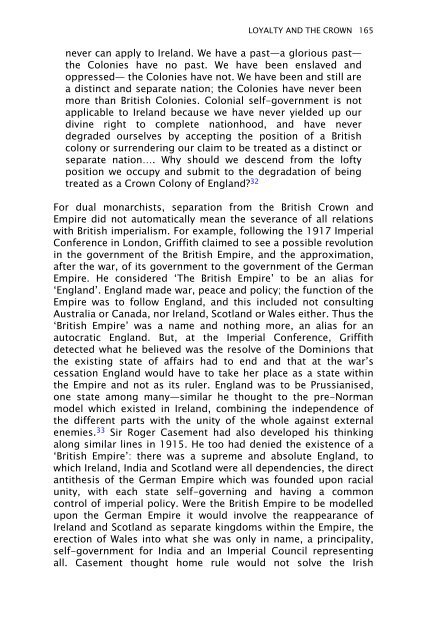Dividing Ireland: World War I and Partition
Dividing Ireland: World War I and Partition
Dividing Ireland: World War I and Partition
Create successful ePaper yourself
Turn your PDF publications into a flip-book with our unique Google optimized e-Paper software.
LOYALTY AND THE CROWN 165<br />
never can apply to <strong>Irel<strong>and</strong></strong>. We have a past—a glorious past—<br />
the Colonies have no past. We have been enslaved <strong>and</strong><br />
oppressed— the Colonies have not. We have been <strong>and</strong> still are<br />
a distinct <strong>and</strong> separate nation; the Colonies have never been<br />
more than British Colonies. Colonial self-government is not<br />
applicable to <strong>Irel<strong>and</strong></strong> because we have never yielded up our<br />
divine right to complete nationhood, <strong>and</strong> have never<br />
degraded ourselves by accepting the position of a British<br />
colony or surrendering our claim to be treated as a distinct or<br />
separate nation…. Why should we descend from the lofty<br />
position we occupy <strong>and</strong> submit to the degradation of being<br />
treated as a Crown Colony of Engl<strong>and</strong>? 32<br />
For dual monarchists, separation from the British Crown <strong>and</strong><br />
Empire did not automatically mean the severance of all relations<br />
with British imperialism. For example, following the 1917 Imperial<br />
Conference in London, Griffith claimed to see a possible revolution<br />
in the government of the British Empire, <strong>and</strong> the approximation,<br />
after the war, of its government to the government of the German<br />
Empire. He considered ‘The British Empire’ to be an alias for<br />
‘Engl<strong>and</strong>’. Engl<strong>and</strong> made war, peace <strong>and</strong> policy; the function of the<br />
Empire was to follow Engl<strong>and</strong>, <strong>and</strong> this included not consulting<br />
Australia or Canada, nor <strong>Irel<strong>and</strong></strong>, Scotl<strong>and</strong> or Wales either. Thus the<br />
‘British Empire’ was a name <strong>and</strong> nothing more, an alias for an<br />
autocratic Engl<strong>and</strong>. But, at the Imperial Conference, Griffith<br />
detected what he believed was the resolve of the Dominions that<br />
the existing state of affairs had to end <strong>and</strong> that at the war’s<br />
cessation Engl<strong>and</strong> would have to take her place as a state within<br />
the Empire <strong>and</strong> not as its ruler. Engl<strong>and</strong> was to be Prussianised,<br />
one state among many—similar he thought to the pre-Norman<br />
model which existed in <strong>Irel<strong>and</strong></strong>, combining the independence of<br />
the different parts with the unity of the whole against external<br />
enemies. 33 Sir Roger Casement had also developed his thinking<br />
along similar lines in 1915. He too had denied the existence of a<br />
‘British Empire’: there was a supreme <strong>and</strong> absolute Engl<strong>and</strong>, to<br />
which <strong>Irel<strong>and</strong></strong>, India <strong>and</strong> Scotl<strong>and</strong> were all dependencies, the direct<br />
antithesis of the German Empire which was founded upon racial<br />
unity, with each state self-governing <strong>and</strong> having a common<br />
control of imperial policy. Were the British Empire to be modelled<br />
upon the German Empire it would involve the reappearance of<br />
<strong>Irel<strong>and</strong></strong> <strong>and</strong> Scotl<strong>and</strong> as separate kingdoms within the Empire, the<br />
erection of Wales into what she was only in name, a principality,<br />
self-government for India <strong>and</strong> an Imperial Council representing<br />
all. Casement thought home rule would not solve the Irish








